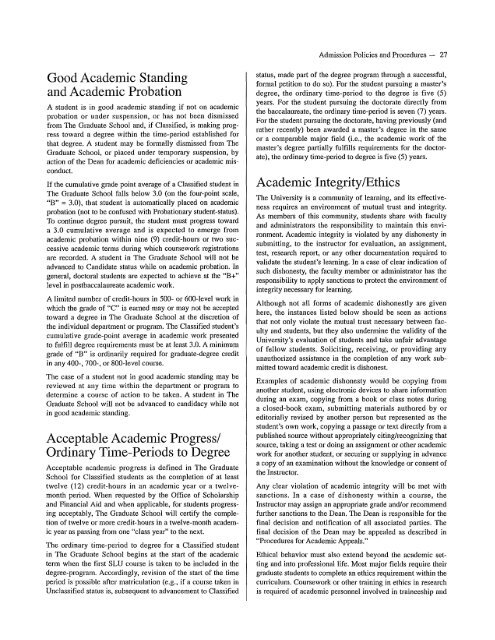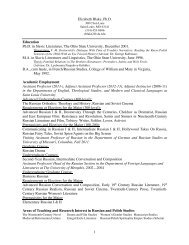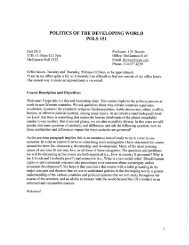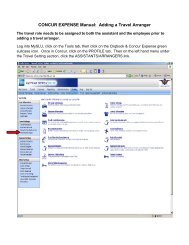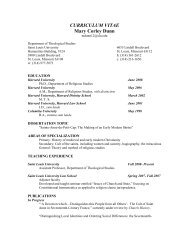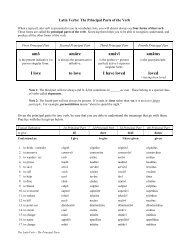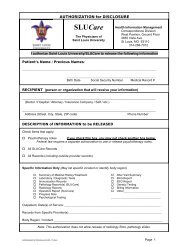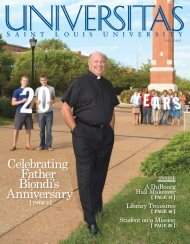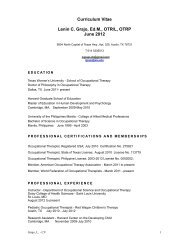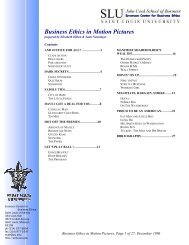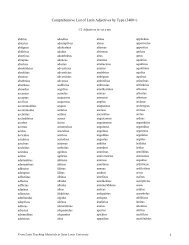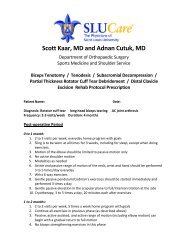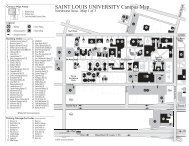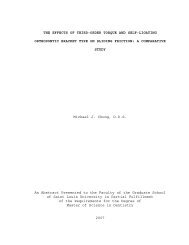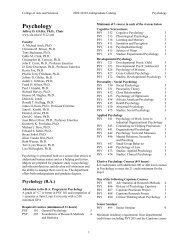Program Manual - Saint Louis University
Program Manual - Saint Louis University
Program Manual - Saint Louis University
Create successful ePaper yourself
Turn your PDF publications into a flip-book with our unique Google optimized e-Paper software.
Good Academic Standing<br />
and Academic Probation<br />
A student is in good academic standing if not on academic<br />
probation or under suspension, or has not been dismissed<br />
from The Graduate School and, if Classified, is making progress<br />
toward a degree within the time-period established for<br />
that degree. A student may be formally dismissed from The<br />
Graduate School, or placed under temporary suspension, by<br />
action of the Dean for academic deficiencies or academic misconduct.<br />
If the cumulative grade point average of a Classified student in<br />
The Graduate School falls below 3.0 (on the four-point scale,<br />
"B" 3.0), that student is automatically placed on academic<br />
probation (not to be confused with Probationary student-status).<br />
To continue degree pursuit, the student must progress toward<br />
a 3.0 cumulative average and is expected to emerge from<br />
academic probation within nine (9) eredit-hours or two successive<br />
academic terms during which eoursework registrations<br />
are recorded. A student in The Graduate School will not be<br />
advanced to Candidate status while on academic probation. In<br />
general, doctoral students are expected to achieve at the "B+"<br />
level in postbaccalaureate academic work.<br />
A limited number of credit-hours in 500- or 600-level work in<br />
which the grade of "C" is eamed mayor may not be accepted<br />
toward a degree in The Graduate School at the discretion of<br />
the individual department or program. The Classified student's<br />
cumulative grade-point average in academic work presented<br />
to fulfill degree requirements must be at least 3.0. A minimum<br />
grade of "B" is ordinarily required for graduate-degree eredit<br />
in any 400-, 700-, or 800-level course.<br />
The case of a student not in good aeademic standing may be<br />
reviewed at any time within the department or program to<br />
determine a course of action to be taken. A student in The<br />
Graduate School will not be advanced to candidacy while not<br />
in good academic standing.<br />
Acceptable Academic Progress/<br />
Ordinary Time-Periods to Degree<br />
Acceptable academic progress is defined in The Graduate<br />
School for Classified students as the completion of at least<br />
twelve (12) credit-hours in an academic year or a twelvemonth<br />
period. When requested by the Office of Scholarship<br />
and Financial Aid and when applicable, for students progressing<br />
acceptably, The Graduate School will certify the completion<br />
of twelve or more credit-hours in a twelve-month academic<br />
year as passing from one "class year" to the next.<br />
The ordinary time-period to degree for a Classified student<br />
in The Graduate School begins at the start of the academic<br />
tenn when the first SLU course is taken to be included in the<br />
degree-program. Accordingly, revision of the start of the time<br />
period is possible after matriculation (e.g., if a eourse taken in<br />
Unclassified status is, subsequent to advancement to Classified<br />
Admission Policies and Procedures - 27<br />
status, made part of the degree progranl through a successful,<br />
formal petition to do so). For the student pursuing a master's<br />
degree, the ordinary time-period to the degree is five (5)<br />
years. For the student pursuing the doctorate directly from<br />
the baccalaureate, the ordinary time-period is seven (7) yeaTS.<br />
For the student pursuing the doctorate, having previously (and<br />
rather recently) been awarded a master's degree in the same<br />
or a comparable major field (I.e., the academic work of the<br />
master's degree partially fulfills requirements for the doctorate),<br />
the ordinary time-period to degree is five (5) years.<br />
Academic Integrity/Ethics<br />
The <strong>University</strong> is a community of learning, and its effectiveness<br />
requires an environment of mutual trust and integrity.<br />
As members of this eommunity, students share with faculty<br />
and administrators the responsibility to maintain this environment.<br />
Academic integrity is violated by any dishonesty in<br />
submitting, to the instructor for evaluation, an assignment,<br />
test, research report, or any other documentation required to<br />
validate the student's learning. In a case of clear indication of<br />
such dishonesty, the faculty member 01' administrator has the<br />
responsibility to apply sanctions to protect the environment of<br />
integrity necessary for learning.<br />
Although not all forms of academic dishonestly are given<br />
here, the instances listed below should be seen as actions<br />
that not only violate the mutual trust necessary between faculty<br />
and students, but they also undennine the validity of the<br />
<strong>University</strong>'S evaluation of students and take unfair advantage<br />
of fellow students. Soliciting. receiving, or providing any<br />
unauthorized assistance in the completion of any work submitted<br />
toward academic credit is dishonest.<br />
Examples of academic dishonesty would be copying from<br />
another student, using electronic devices to share information<br />
during an exam, copying from a book or class notes during<br />
a closed-book exam, SUbmitting materials authored by or<br />
editorially revised by another person but represented as the<br />
student's own work, copying a passage 01' text directly from a<br />
published source without appropriately citing/reeognizing that<br />
source, taking a test or doing an assignment or other academic<br />
work for another student, or securing or supplying in advance<br />
a copy of an examination without the knowledge or consent of<br />
the Instructor.<br />
Any clear violation of academic integrity will be met with<br />
sanctions. In a case of dishonesty within a course, the<br />
Instructor may assign an appropriate grade and/or recommend<br />
further sanctions to the Dean. The Dean is responsible for the<br />
final decision and notification of all associated parties. The<br />
final decision of the Dean may be appealed as described in<br />
"Procedures for Academic Appeals."<br />
Ethical behavior must also extend beyond the academic setting<br />
and into professional life. Most major fields require their<br />
graduate students to complete an ethics requirement within the<br />
curriculum. Course work or other training in ethics in research<br />
is required of academic personnel involved in traineeship and


